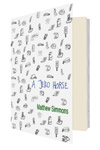Dear Matthew Simmons,
I am writing today to ask you a question about your book, which I read with great pleasure: what is it? Forgive the directness of the question, but after reading A Jello Horse I feel as though I know you a little bit. Of course, I realize the “person” I have come to “know” is not you per se but a construct, a protagonist. That said, your use of the second person is clearly a ruse meant to throw the reader off: “You’ve taken a lot of road trips, most by yourself, some with friends, and this just feels like a road trip like any other. Like you’re going out to see a roadside attraction. Like you’re not going to a funeral.” When you say “you,” you mean “me” (meaning you), right?
Nevertheless, your story about taking a trip across the Midwest to attend the memorial service of the brother of a close friend feels honest. I say this in perfect sincerity, but I really have no idea if it’s honest or not, honesty being a word we use to describe prose that faithfully describes the human experience. After a declarative sentence or two the reader starts thinking: This writer knows road trips; I know road trips. This writing feels real; ergo, it must be honest. How then do you explain the giant desert tortoise, “large as a minor-league baseball stadium”? Or the herd of humongous antelope “grazing on the buildings of the city”? Or visits to clearly fictional roadside attractions like Jackalope Village and the House of 2,000 Telephones?
The animals are introduced as childhood fantasies, then when the protagonist is stressed or overtired or poleaxed by grief, they reappear. So are they real, or the hallucinations of someone who has been driving too long? I think the title is the key to the book’s slippery relationship between fact and fiction: gelatin is mythically derived from ground horse hooves, so if I construct the likeness of a horse out of Jell-O, I’m making an image with materials that contain the essence of the thing being represented. You seem to be saying that my story may be strange, but its raw material is the truth. Am I way off here?
It would help clarify things if I knew what to call your book. Postmodern picaresque? Neo-magical-realism? Meta-memoir (with jackalopes)? Yes, I saw the disclaimer: “All details are drawn from the author’s imagination,” but nearly all books say that now. We live in an age where fiction is lawyered up and fact-checked.
In spite of my confusion (or perhaps because of it), I was drawn to the way the narrator questions his grief. The tragedy of his friend’s brother’s death isn’t his own, so he’s at somewhat of a remove from the inner circle of suffering. This is what happens when people die. The ones left behind are thrown together by the terrible event, and everyone sane enough to think rationally wonders if they’re behaving appropriately. It’s a fascinating problem for a protagonist: it’s his story, but the story doesn’t belong to him, and who hasn’t been there?
When the affairs of the dead consume the living, the line between “fact” and “fiction” gets, well—let’s be honest here—there is no line. It gets obliterated as we relinquish the dead to that fiction-making machine called memory. Would knowing that you lost someone, that you found someone, or that the someone who was lost and found was you, Matthew Simmons, really make a difference?
I think I just answered my own question.
All best,
—Jim Ruland





